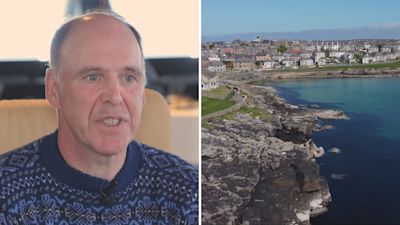The 'Viking' DNA screening saving lives in Scotland’s most remote islands

John took part in a study to find out if he was related to Vikings, before finding out he had a gene mutation, as ITV News Scotland Reporter Louise Scott reports
Words by Louise Scott & Stephanie Docherty
When John Arthur volunteered to take part in a local study over a decade ago, he never thought it could end up saving his life.
The 63-year-old fisherman just wanted to know if he had Viking ancestry, so he donated blood to a University of Edinburgh study, after hearing a talk in his local village.
Ten years later, a letter came through the door which potentially saved his life.
John carried a variant of the BRCA2 gene which puts him at a much higher risk of developing cancer.
After receiving the letter, he went to the doctor and was diagnosed with stage one prostate cancer.
“If I had not done the study and put these things together, I would never have gone to the doctor in the first place," John told ITV News.
“I thought I better go and get tested and get the [prostate] test done to find out more about it.
“I wouldn't have even thought about going to the doctor about it, to tell the truth."
After his early diagnosis, in February this year he underwent a successful operation to remove his prostate and is already back to work with the all clear.
He now believes everyone should have access to these types of tests to prevent serious health conditions from developing in the first place.
John Arthur is one of more than 60 volunteers who were sent letters last year after contributing to the study which found that those from Shetland, or with ancestors from the islands, are at a much greater risk of carrying genetic variants which can cause a number of life-threatening conditions.
These include the BRCA2 gene which causes breast, ovarian and prostate cancer and the KCNH2 gene which causes fatal heart rhythms.
Plans have now been unveiled for a groundbreaking genetic screening programme to provide another 5,000 Shetlanders the opportunity to find out if they are carriers of these variants.
Professor Jim Flett Wilson from the University’s Usher Institute visited Lerwick to announce the £1 million fundraising campaign.
“I've been studying the genetics and the health of the people of Orkney and Shetland for over 20 years now," Professor Wilson said.
"When I started this, there wasn't all that much that we could do and now we can read all of the DNA of everyone for a reasonable price so we can learn enormous amounts.
“The first one we noticed was the breast cancer variant. Of course, you find these things in London and Edinburgh, but they're rare. Whereas here we were seeing it in remarkable numbers of people. And when we looked further, we found this wasn't the only case. There were other examples, different genes, different diseases. All of them had become a whole lot more common than we would have expected.
“It's because a lot of people from remote communities have been marrying locally for many years, so many of them come down from one ancestor. But if that ancestor had a mutation, had a change in his or her genes, then it would have come down the generations all the way down to today.
“This happens everywhere on Earth, but people spread all over the world. They're mixed up there in Yorkshire and America. And here obviously some people have left, but there's still a concentration, a core of local people. And we see this this increase in frequency and having these genes, it doesn't necessarily mean that they have cancer or that they have a rare condition."
The screening will focus on 50 genetic variants that have “actionable findings”, meaning that they can be treated through NHS to manage the condition.
Volunteers in the programme will be notified of their genetic findings and be advised on the appropriate NHS pathway of care.
“The NHS is great as it stands, but it really works in a reactive mode. It only tries to fix people when they're broken, and I think we want to turn this around," Professor Wilson said.
"This is a great example of preventative medicine, and we want to start in Shetland because it has the greatest need. And it's also an opportunity.
"It's not that big a number of genes that we need to look at. So there's a sort of cost effectiveness argument here as well. It helps to save lives."
Subscribe free to our weekly newsletter for exclusive and original coverage from ITV News. Direct to your inbox every Friday morning.
The Jewish community in England have recently been given access to a similar screening programme, because of the greater levels of the BRCA genes found within their community. The Viking Genes study believes it is only fair to roll this out to other remote communities, like the Scottish islands.
The screening will be designed for people over the age of 16, from anywhere in Shetland, by a DNA saliva collection kit.
The new screening project will in time identify those individuals who may not be affected themselves, but who carry an elevated risk of passing on certain genetic conditions to their children.
The campaign says it could take around one year to lay the “ground work” for the project before screening commences.
Want a quick and expert briefing on the biggest news stories? Listen to our latest podcasts to find out What You Need To Know…